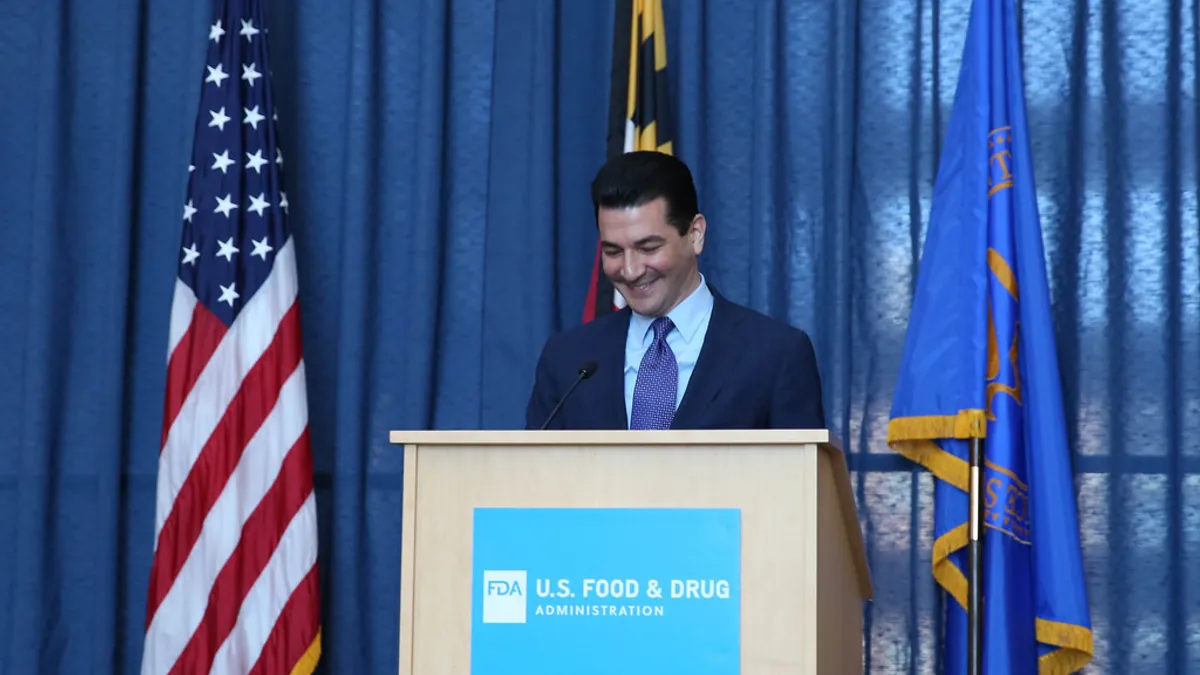Dive Brief:
- FDA issued the third iteration of its Working Model for its Software Pre-Certification Program on Monday, outlining plans to utilize the De Novo pathway in the pilot program aimed at testing a regulatory model where firms are pre-cleared to market medical device software.
- Traditional marketing submissions will still be required for firms making Software as a Medical Device (SaMD), but the agency said additional legislative authority from Congress may be needed to enable direct market entry for low-risk products in the future by precertified manufacturers.
- A proposed Pre-Cert pathway made up of an "excellence appraisal," review pathway determination, streamlined review and a real-world performance plan will run in parallel with FDA's traditional review process for each pilot test case. The aim is to see if its Pre-Cert program results in a comparable process for determining safety and effectiveness.
Dive Insight:
The FDA has been working for several years to revamp how it reviews software as a medical device as more companies move into the space with wearables and other hybrid products. Nine companies including Apple, Fitbit and Johnson & Johnson are part of the pilot.
Commissioner Scott Gottlieb said in a statement the agency still plans to test its pilot program this year.
But one industry lawyer questioned if FDA's most recent iteration will severely limit the potential for the Pre-Cert program by depending on the De Novo pathway, which has historically seen little use compared to its 510(k) program.
"FDA has been selling this precert program as the best thing since sliced bread for essentially all software as a medical device," said Brad Thompson, an attorney at Epstein Becker Green. "Now they're saying that at least initially it will be restricted to unprecedented software. That is a very small slice, and will therefore be of limited interest to the software industry."
Gottlieb said the agency believes its current regulatory authority for the program is sufficient to test the pilot despite concerns from industry groups such as the Clinical Decision Support Coalition and others.
FDA laid out in a new document how it plans to utilize the De Novo pathway to conduct the pilot program under current authorities. A company would first be evaluated during a so-called excellence appraisal based on the principles outlined in the working model before submitting a Pre-Cert De Novo request.
The application, which will combine a traditional De Novo with elements from the appraisal, will help inform if a device "is of low to moderate risk and that general controls or general and special controls can provide a reasonable assurance of safety and effectiveness."
"We will review the sponsor's traditional De Novo submission for its device and using that same submission information we will, in parallel, review the sponsor's Excellence Appraisal information with the proposed streamlined submission content," Gottlieb said. "The sponsor will incur no additional burden. Instead, the FDA will set up two parallel review processes, one using the Pre-Cert model and one using the traditional approach to the review of a De Novo application."
Thompson told MedTech Dive in an email that FDA's plan to adhere to existing statutes and regulations before seeking statutory authority once a final approach for the Pre-Cert program is developed appears to assuage his concerns about regulatory overreach.
But the lawyer argued it is not clear FDA will take that approach, noting the agency's four documents outlining its vision for the program "read very differently, and reconciling them is tough." He also questioned if relying on the De Novo pathway will fulfill the initial vision for the Pre-Cert program given the low utilization of the pathway compared to the 510(k) program.
In October, top Democrats on the Senate HELP Committee questioned if FDA had the statutory authority to launch the program. Lawmakers expressed concern that the agency was opening it up to companies without medical device experience; the use of third party organizations to conduct assessments; and the potential negative implications for agency funding if user fees are not collected due to fewer applications being submitted.
In December, Bakul Patel, associate center director for digital health, told MedTech Dive FDA was still working to respond to the Democrats' concerns. Patel said the agency is still working through how the program will be run, saying some practicalities will be figured out along the way. But it is not clear if that is satisfactory to the program's critics.
The medical device lobby, for its part, has been generally supportive of FDA's effort, but did not have an immediate reaction to the latest updates.
"We're still reviewing the latest documents released by FDA on their Digital Health Pre-Cert Program," Zach Rothstein, AdvaMed VP Technology & Regulatory Affairs, said in a statement. "AdvaMed has been supportive of this initiative as it promises to provide an efficient pathway to ensure the safety and effectiveness of these new digital technologies while promoting continued innovation in this space."
FDA plans to hold a webinar Feb. 7 to answer developer questions about the Pre-Cert Pilot Program. The agency is also monitoring the continuous docket for public comments on the Pre-Cert Program approximately every two weeks, but comments on the new working model appear to be due March 8.
"In general, the working model seems very much still simply a concept paper rather than a true roadmap that provides the needed details to assess this program. I understand that they basically want to spend this year testing the program and developing some of those details. That's fine. But it will certainly be hard to get enthusiastic about this program in the absence of meaningful answers to these questions," Thompson told MedTech Dive.











